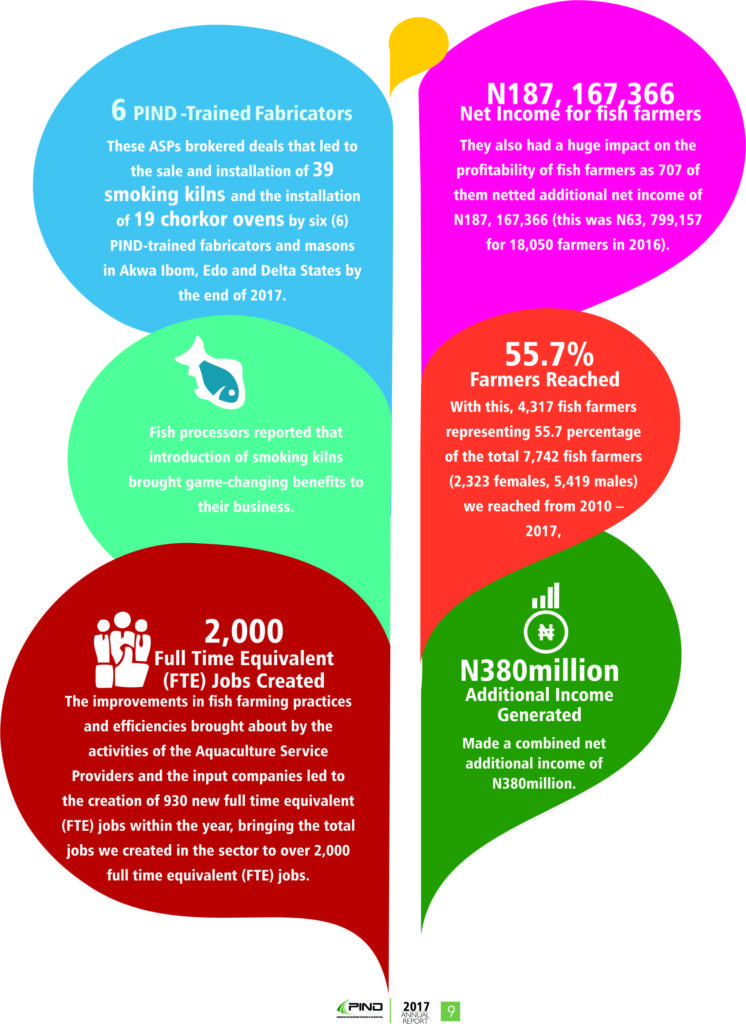Under aquaculture, PIND’s strategy remains facilitating aquaculture service providers (ASPs) to make a business out of selling services to new and existing fish farmers on business skills and best pond management practices. These include selecting appropriate catfish species, preparing, screening, and liming their ponds; effectively using fertilizer, feed, medicine, water testing kits and maintaining proper records.
Although the ASPs receive start-up grants, they soon build on the initial profits to expand and continue the services without follow-on support from us. This not only attracts more players into the sector, but also ensures a sustainable supply of aquaculture business services for the region’s fish farmers that is not dependent on PIND or donor projects.
In 2017, this approach attained scale and impact as we provided grants to seven (7) ASPs, in addition to the five (5) who received same a year earlier. These ASPs, and those who had copied the model with funds leveraged from other sources and from a fee-for-training model, held several cycles of demonstrations in Ondo, Akwa Ibom, Delta, Cross River and Rivers States for farmers, and for National Youth Service Corp (NYSC) members and repentant militants who desired to venture into fish production.

The 20 active Aquaculture Service Providers (ASPs) we trained this year delivered services and training to 2,021 fish farmers. This makes the total number of fish farmers reached from 2010 – 2017 to 7,742 (5,419 males, 2,323 females) (up from the 3,610 reached in 2016). Most of these farmers have learned and adopted these improved practices and as a result, they now harvest fish in the fifth month of the pond cycle at an average weight of 1kg per fish as against 0.7kg for non-benefitting farmers and also have the mortality rate of their fish down to 10% compared to the 13% by non-adopting farmers.
Along with PIND, the ASPs also established relationships with feed companies and other key actors which catalyzed investment in grants and loans totaling N284,243,526 (from N21,500,000 in 2016) within the period to run demonstration ponds as part of the feed companies’ marketing strategy to reach new markets and to promote agricultural enterprises. This brought the value of our leveraged investments into the sector from inception in 2010 to 2017 to over N470 million.
Fabricators and Service Providers Expanded Markets for Efficient Fish Smoking Technologies: The intervention also focused on using the ASPs to improve access to market of efficient fish smoking technologies for the farmers.

In 2016, PIND conducted a marketing and sales training for ASPs on how to expand and strengthen their service offering to include marketing of fish smoking technologies to farmers/processors and potential investors. These ASPs brokered deals that led to the sale and installation of 39 smoking kilns and the installation of 19 chorkor ovens by six (6) PIND-trained fabricators and masons in Akwa Ibom, Edo and Delta States by the end of 2017. Fish processors reported that introduction of smoking kilns brought game-changing benefits to their business.
The improvements in fish farming practices and efficiencies brought about by the activities of the Aquaculture Service Providers and the input companies led to the creation of 930 new full time equivalent (FTE) jobs within the year, bringing the total jobs we created in the sector to over 2,000 full time equivalent (FTE) jobs. They also had a huge impact on the profitability of fish farmers as 707 of them netted additional net income of N187, 167,366 (this was N63, 799,157 for 18,050 farmers in 2016). With this, 4,317 fish farmers representing 55.7 percentage of the total 7,742 fish farmers (2,323 females, 5,419 males) we reached from 2010 – 2017, have made a combined net additional income of N380million.
DOWNLOAD REPORT HERE PIND 2017 Annual Report (4223 downloads )




